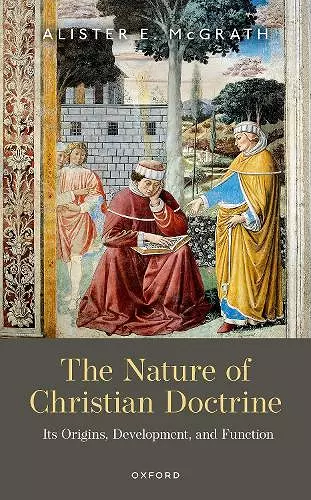The Nature of Christian Doctrine
Its Origins, Development, and Function
Format:Hardback
Publisher:Oxford University Press
Published:1st Feb '24
Should be back in stock very soon

A groundbreaking account of the origins, development, and enduring significance of Christian doctrine, explaining why it remains essential to the life of Christian communities. Noting important parallels between the development of scientific theories and Christian doctrine, Alister E. McGrath examines the growing view of early Christianity as a 'theological laboratory'. We can think of doctrinal formulations as proposals submitted for testing across the Christian world, rather than as static accounts of orthodoxy. This approach fits the available evidence much better than theories of suppressed early orthodoxies and reinforces the importance of debate within the churches as a vital means of testing doctrinal formulations. McGrath offers a robust critique of George Lindbeck's still-influential Nature of Doctrine (1984), raising significant concerns about its reductionist approach. He instead provides a more reliable account of the myriad functions of doctrine, utilising Mary Midgley's concept of 'mapping' as a means of coordinating the multiple aspects of complex phenomena. McGrath's approach also employs Karl Popper's 'Three Worlds', allowing the theoretical, objective, and subjective aspects of doctrine to be seen as essential and interconnected. We see how Christian doctrine offers ontological disclosure about the nature of reality, while at the same time providing a coordinating framework which ensures that its various aspects are seen as parts of a greater whole. Doctrine provides a framework, or standpoint, that allows theological reality to be seen and experienced in a new manner; it safeguards and articulates the core vision of reality that is essential for the proper functioning and future flourishing of Christian communities.
Many of us owe a debt of gratitude to Alister McGrath for his many writings. His trademark clarity of thought and expression ensure that I am always happy to start reading one of his books, because I know that I will understand what he is saying, and that I will learn new things. * Church Times *
Many of us owe a debt of gratitude to Alister McGrath for his many writings. His trademark clarity of thought and expression ensure that I am always happy to start reading one of his books, because I know that I will understand what he is saying, and that I will learn new things. * Church Times *
This book advances the idea that doctrine develops in theological laboratories and so is diverse and far-ranging at the same time that it is cohesive and unifying. While omitting more historical doctrinal disputes such as those in Pauline epistles (e.g., whether to maintain dietary rules), it nonetheless gives a fascinating explanation of how different doctrinal moments might interact when connected by maps of specific imagery and metaphors to larger cultural conversations. McGrath explains how objects of faith both have larger contemplative meaning and create comprehensive frameworks of devotion and meditation. * Janelle Peters *
ISBN: 9780198901440
Dimensions: 223mm x 142mm x 16mm
Weight: 384g
224 pages